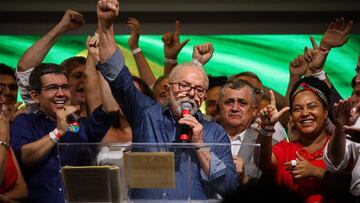Brazil election: Who is Lula da Silva, the new president of Brazil? Why was he in jail?
Brazilians gave former President Lula da Silva another opportunity to lead the South American nation calling it a “resurrection” in his victory speech.

“They tried to bury me alive and here I am,” Brazil’s newly elected President Luiz Inácio ‘Lula’ da Silva said at the start of his victory speech. Lula won 50.9% of the vote to beat far-right incumbent Jair Bolsonaro after a divisive campaign. His “resurrection”, as he called his triumph in the narrowly decided runoff on Sunday, is a stunning turnaround.
The country’s first working class president previously served two terms from 2003-2010, left office with a personal approval rating of 87 percent. However, eight years later he was jailed in Brazil’s biggest corruption scandal. He was sentenced to 12 years in but was released after 19 months after the Supreme Court annulled the case, citing procedural errors.
Also see:
Who is the new president of Brazil Lula da Silva?
Lula was born in 1954 to illiterate parents, a farm hand and a seamstress, in Northeastern Brazil and didn’t learn to read himself until age 10. He, his siblings and mother moved to São Paulo in 1952 to rejoin the patriarch of the family. There he began working informal jobs at age 12 to help his family financially.
He would later become a metal worker, which would led him into his getting involved in labor unions when he lost one of his little fingers in an accident. He climbed up through the ranks of the Steel Workers’ Union becoming president in 1975.
Fight to end Brazil’s military dictatorship
He helped organize and lead major labor union strikes against the military dictatorship that controlled Brazil until 1985. Those were found to be illegal by the junta’s courts which earned him his first stent in jail for a month.
In 1980 Lula was one of the founding members of the leftist Partido dos Trabalhadores (PT) or Workers Party. Through their efforts along with diverse elements from Brazilian society, the first elections in 29 years to elect a president by direct popular vote happened in 1989.
Lula runs to become president of Brazil
Lula ran for president as the Workers Party candidate that year but a more business-friendly candidate beat him in the second round. Fernando Collor de Mello would end up resigning in 1992 to avoid impeachment for allegedly embezzling public money. Lula would make two more attempts to become president in 1994 and 1998 before being successful for the first time in 2002.
As president his policies reduced deep social inequality through expanding education and healthcare while lifting millions of Brazilians out of extreme poverty. He benefited from years of robust growth boosted by a global commodities boom. Brazil’s economy rose to become the sixth-largest in the world under his presidency.
Lula’s fall from grace and imprisonment
After Lula left office a vast kickback scheme on public contracts came to light benefiting leaders from major political parties including the PT. The scandal tarnished his reputation along with being put on trial for receiving bribes from engineering firms in the form of gifts and real estate revealed in the graft probe.
He was convicted in 2017 and sentenced to nine and a half years, which was increased to 12 years when his appeal failed. The convictions barred him from running for office in the 2018 elections which swept Bolsonaro to power on the back of conservative reaction and antipathy toward the Workers Party.
Lula has always denied the charges calling them politically motivated to frame him and keep him from Brazilian politics. He was freed after 580 days in jail when Brazil’s Supreme Court annulled his convictions. They cited procedural errors with the judge overseeing his prosecution finding him of being partial.






